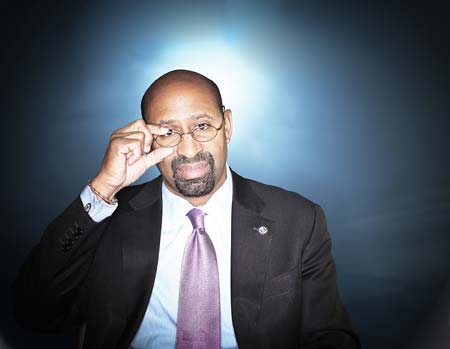By Austin Nolen
During the last stretch of Philadelphia’s recent primary, current mayor Michael Nutter spoke at a gathering of Philly for Change at Tattooed Mom’s bar on South Street. Asked by another reporter whether he was planning to run for higher office, he responded that he has “no expectations” and certainly “will not be on any ballet in 2016.”
Yet, at the same time the media was focusing on the current Democratic candidates, Nutter’s campaign committee raised over $100,000 in 2014 alone and held at least one fundraiser. Donations to a campaign committee are legally restricted for use in influencing elections, and the campaign’s attorney told The Declaration that Nutter may well run for higher office. Moreover, the current mayor spent over $30,000 last year in a manner that arguably undercuts transparency provisions of state campaign finance law, and illustrates just how loose the restrictions on campaign spending are.
Campaign Cash from City Power Players
Since Nutter has been elected mayor for two terms in a row, Philadelphia’s City Charter prohibited him from running again in 2015, though he could try for reelection in the next cycle. In spite of this, his mayoral campaign committee raised $111,400 from a variety of donors in 2014. The group includes such local heavyweights as Local 98 of the International Brotherhood of Electrical Workers and PECO at $11,500 each and the Comcast/NBC PAC at $5,000.
Nutter also held at least one fundraiser for his campaign committee last year, according to lobbyist Holly Kinser, whose Kinser Group donated $5,000 on November 3rd. On that same day, Nutter also received donations from Michael Grasso, owner of real estate firm Grasso Holdings, and TKMG Associates, L.P., which according to a press report bought the former Tastycake manufacturing factory in the city to redevelop it, both for $1,000.
Pennsylvania campaign finance law requires that these contributions, together with the roughly $126,000 that the committee started the year with, be used only for the purposes of influencing an election, including a potential future campaign by Nutter for higher office.
“The Mayor may well opt to seek elected office in the future, as he is only 58 years old and is capable of working long hours and performing at a high level. History shows that former Philadelphia Mayors run for other elected offices,” a committee representative told me.
Since the 1952 creation of the city’s Home Rule Charter, only Joseph Sill Clark (1952-1956) and Ed Rendell (1992-2000) have managed to attain higher elected office, as US Senator and Pennsylvania Governor, respectively.
A Checkered History of Transparency
The mayor has long sought to portray himself as a candidate and politician who supports transparency. As the Daily News wrote in its endorsement of Nutter during his first mayoral run, voters at the time were “imagining a City Hall snatched from its legacy of pay-to-play, finally shaking off the reputation of a content and corrupt city and being led by someone who can wrangle the budget, crime and schools – and still talk about sustainability, transparency and ethics.”
While his record on transparency is decidedly mixed – including his administration’s handling of Right-to-Know requests – Nutter has had accomplishments in this area. He was the plaintiff in the case that conclusively established the City’s right to regulate campaign finance in addition to the minimal restrictions in state law. As a mayoral candidate, he sued other hopefuls, among them John “Johnny Doc” Dougherty and Chaka Fattah, whom he alleged were violating the City’s then-recently-passed campaign finance law, and took the fight all the way to the Pennsylvania Supreme Court.
However, when The Declaration reviewed Nutter’s campaign finance filings for 2014, we noticed something odd. I was tipped off by a source familiar with Philadelphia campaign finance that politicians sometimes put campaign expenses on their personal credit card and then pay off the credit card with campaign money. The committee then reports the credit card payoff, rather than the specific services purchased. According to the source, it’s possible that this is done to hide illegal spending. Reviewing the mayor’s filings, I noticed that his committee had spent $33,670.12 and reported the single credit card bill payoff instead of the line item purchases. In order to determine whether the committee was spending money improperly, The Declaration requested credit card spending receipts under a provision of the state election code.
Initially, the campaign provided only copies of the credit card bills which contained the single charge, and when pressed by myself and Philadelphia election supervisor Tim Dowling, hired a lawyer to handle the request. The committee eventually provided the requested receipts, but insisted in an email that they were not legally required to do so, even while calling my effort “public minded.”
Dowling, however, sharply disagreed with the campaign’s legal interpretation.
“Where an Attorney may see things as grey areas, I see things as black and white. I understand your stated position on behalf of your client, however, the statute is pretty clear…When a candidate’s campaign committee uses a credit card to make numerous expenditures, and then uses one check from the Campaign committee to expend funds to pay for those items, this mitigates the strength of the Election Code’s intent, which is transparency, and convinces individuals, that are as you stated, public-minded, to make these requests.”
He also informed the mayor’s lawyer: “If the requester is not satisfied, and continues to make repeated requests for the information, I have a duty as the supervisory officer to proceed accordingly.”
After weeks of prodding, Nutter’s camp disclosed the remaining amount of receipts. According to a committee representative, “Mayor Nutter used the credit card to pay for dining in restaurants with supporters of his political ambitions, and lodging when he traveled out of the City on political matters that furthered his political goals, such as attending the Conference of Mayors,” and this appears to be borne out by the documents received by The Declaration.
It should be noted, however, that Dowling did not specifically review the campaign’s records, and in an emailed statement, did not directly address whether or not all of the expenditures itemized on the receipts fell within the letter of the law.
Some of the expenditures illustrate just how broad “political goals” can be, however, as when Nutter used campaign funds to pay off $975.23 in expenses and foreign transaction fees he incurred while in Italy to visit the Pope in March 2014, largely from a single restaurant tab. The Mayor also frequently ran up tabs of hundreds of dollars at expensive restaurants both locally and on business elsewhere and then used campaign money to reimburse these costs as well.
I also discovered another anomaly: the lawyer who the mayor hired to respond to my request, Susan L. Burke, may not be able to legally advise him about Pennsylvania law. According to both online records and a follow-up phone call to the PA Disciplinary Board, Ms. Burke is registered as a “retired” attorney in Pennsylvania. The Disciplinary Board states that retired attorneys cannot practice law, and among other things, this means she cannot advise clients about state law. PA Supreme Court precedent also holds that practice of law includes advising a client about Pennsylvania law. Reached for comment, Ms. Burke disputed this interpretation, but did not provide any detail to support her position. She is an active lawyer in other states, and previously represented the mayor in his PA Supreme Court case.
In response to The Declaration‘s transparency and ethics inquiries, a committee representative told us that the mayor “fully supports transparency in campaign finances,” and that “as I am sure any informed reader will understand, they are free to review all contributions made to Mayor Nutter, as they are all a matter of public record.”
Campaign finance filings for city candidates are available online through the Board of Ethics. Some city candidates’ filings may also be available online through the Pennsylvania Department of State.
Nutter Credit Card Receipts (January – October 2014)
Nutter Credit Card Receipts (September – November 2014)


[…] the first time questions have been raised about Nutter’s finances. Last year, we ran a story on how Nutter’s election campaign committee used donated funds. Much of the committee’s […]
LikeLike